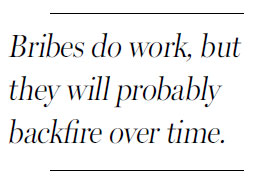Beyond bribery, for parents
Updated: 2013-01-27 08:26
(The New York Times)
|
|||||||||

I've read a small library of articles that have laid out evidence that giving children rewards - from money to sweets to an extra hour before bedtime - not only doesn't work in the long term, it actually has a negative effect on them. So bribing is bad. And yet I, my wife and nearly every other parent I know resorts to this tactic.
What's a beleaguered parent to do instead?
THE TALKING CURE Edward Deci, a professor of psychology at the University of Rochester, New York, said the biggest problem with rewards is that they actually work, at least in the short run. But with children, since you are trying to get them to adopt a behavior "more or less ongoingly for the rest of their lives," the technique will backfire unless you're prepared to offer the same reward every time.
Dr. Deci recommends a three-step alternative. First, be clear about why what you're asking them do is important. Second, be interested in their point of view. Finally, "don't use words like 'should,' 'must' and 'have to,' " he said. "All of those things that convey to them you're a big person trying to push around a little person."
MAKE IT A GAME Alan Kazdin, the director of the Yale Parenting Center, said the problem with incentives is they focus too much attention on the desired result instead of the behavior that leads up to the result.

For example, if you want your children to eat more vegetables, instead of offering them $10 to do so, take the pressure off by telling them they don't have to eat vegetables now but just keep them on their plate. Then you offer a point to whoever can put the least amount of vegetables on their fork. The next day you have a competition for who can touch the fork to their tongue.
SWITCH FROM IF-THEN REWARDS TO NOW-THAT Daniel Pink, author of "Drive," said the problem with bribing is not the rewards; it's the contingency, which is a form of control. He suggests replacing what he calls if-then rewards with now-that rewards, meaning the prize is giving spontaneously and after the fact. "There's no harm in then saying, 'You did a great job. Let's go out for a milkshake.' "
But Mr. Pink cautioned that after-the-fact rewards can quickly turn into an entitlement.
PRAISE IS THE REWARD If you do give rewards occasionally and unexpectedly, what type of rewards are best? Research clearly suggests that praise is usually a sufficient reward, said Carol Dweck, a professor of psychology at Stanford University in California. She suggests parents make their praise specific, and focus on the process the child went through to achieve the behavior. "You could say, 'I really liked the way you waited patiently for me to finish my phone call, because you understood that phone call was important,' " she said. "Or, 'I really liked how you expressed gratitude to Grandma, just like you appreciate it when I thank you for doing something for me.' "
I was relieved that all the experts said it's O.K. to resort to blunt rewards on occasion. If you simply must get that child on the plane, or if you absolutely need that child to stop misbehaving so you can speak to the doctor, go ahead, bribe away. As Dr. Deci told me, "If you're under a lot of stress or in a bad place, then having a conversation at that moment is not going to work."
But, he emphasized, don't let the situation end there. "You need to sit down the next afternoon when everyone's calm, talk it through from both sides, then discuss ways so the behavior doesn't happen again," he said.
The New York Times
(China Daily 01/27/2013 page10)